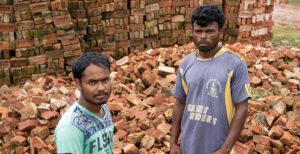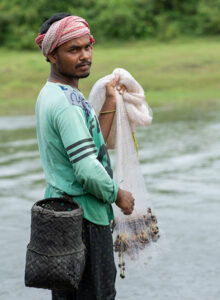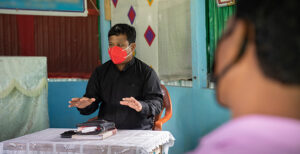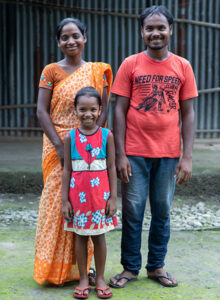Raise funds for Compassion Services
There are many ways you can fundraise, whether it’s a bake sale, a marathon, or a party!
This website will offer limited functionality in this browser. We only support the recent versions of major browsers like Chrome, Firefox, Safari, and Edge.
The green fields and stretching trees of Daito’s village are deceitful. They imply abundance, growth and life—not the desert of opportunity that Daito and most of his neighbors feel. In this village, there are few opportunities to earn income, and the COVID-19 pandemic has made the economic situation worse. Many poor people, like Daito, don’t own their own land, so they can’t farm, and one of the only local industries is a brick factory that pays about £2.50 a day. When the pandemic mushroomed, the factory closed, removing even that poor source of income.

While visiting home, Daito (left) could sometimes work in the local brick factory for very low wages, but the factory closed due to the pandemic.
Before the pandemic, because of their poverty and their village’s dearth of opportunity, Daito and many of the men in his community had traveled far distances to earn income, returning home occasionally to visit their families. Daito was only 9 when he started working as a cleaning boy in a large city north of the village. Later, as a teenager, he found work in a tarp factory in a southern state. He eventually married Gabreil, a woman from his home village, and they had a daughter. He continued traveling to work in the tarp factory, which gave him a decent income to send home.
But in early 2020, while Daito was visiting home, he began seeing news reports about the virus that was sweeping the globe. His friends from the tarp factory told him many people there were getting sick and advised him not to return. Then transportation shut down, so even if Daito had wanted to travel back to work, he couldn’t.

Catching and selling fish has been Daito’s only source of income during the pandemic.
Stuck in the village with no means of income, Daito didn’t know how to provide for his family. The situation snowballed when Daito’s 6-year-old daughter got sick. Her condition grew so severe Daito had to rush her to the hospital. Though she recovered, the treatment cost about twice Daito’s monthly wages from the tarp factory—which he was no longer earning. Desperate, Daito borrowed money.
Circumstances grew grim as the family struggled to buy food. With no income and a mountain of debt, Daito had only one option: fishing and selling his catch in the local market. Daito earned a little money to buy rice and vegetables, but fishing wasn’t a stable source of income. The family also received some government rations of rice, lentils and flour, but these rations didn’t last them the whole month. In fact, they had to carefully ration the morning’s rice to also last for their evening meal.
This family faced a plight experienced by many during the pandemic: According to the humanitarian organization Oxfam, “20 million more people [were] pushed to extreme levels of hunger [in 2021], reaching a total of 155 million people.”
“20 million more people [were] pushed to extreme levels of hunger [in 2021], reaching a total of 155 million people.”
How much would Daito, Gabreil and their daughter’s health suffer from having inadequate nutrition? How long would they be able to survive this way?

GFA pastor Yaphet met with several other pastors in the region to discuss how they and their churches could help people like Daito, who were struggling for survival.
Even in the severity of their situation, however, Daito knew there was a God he could ask for help. And God was burdening the hearts of His children to take action during the economic crisis faced by so many families. Seeing that people like Daito were in desperate need, the GFA pastors met together to devise a plan. They decided they and their congregations would pool together what money and rice they could to help those hardest pressed.
A few days later, the pastors hosted an event to bless about 50 families. When Daito and his wife were called to the front, a pastor handed them a bag of about 11 pounds of rice, along with a blanket and a mosquito net. Smiles stretched across Daito and Gabreil’s faces. Now they had food to last them for a few weeks. The blanket would protect them from impending cold weather, and the net would protect them from mosquito-borne illnesses, a common scourge in the area. These gifts would not only help them and their daughter survive, but they also offered the family hope.
While such simple gifts may seem like a drop in the bucket of severe poverty, they offered this family some basic nourishment during a time of hardship. The 11 pounds of rice would yield about 30 pounds of cooked rice, which hopefully would allow Daito to spend his fishing earnings buying nutritious foods such as vegetables. For a few weeks at least, the family would have some food and some protection from the elements—their burden would be lighter. Daito, Gabreil and their daughter had an extra reminder that God, and His children, were looking out for them, a much-needed encouragement during a time of great anxiety.
“During this pandemic, of course, we all are dealing with fears and anxiety,” Daito said, “because in life we have never seen a situation like this. … It has brought me closer to the Lord, as I learned to pray before the Lord for every single thing, be it small or great.”
“because in life we have never seen a situation like this. … It has brought me closer to the Lord, as I learned to pray before the Lord for every single thing, be it small or great.”

Daito, Gabreil and their daughter received much-needed rice from the church, but many more families in Asia and Africa are still hungry due to the economic disruptions of COVID-19.
The church provided Daito, Gabreil and their daughter with food and other needed items during their time of crisis, but millions more are struggling just to eat. In 2021, Oxfam estimated that hunger was taking the lives of 11 people each minute, causing more fatalities than COVID-19. The situation is likely worsening. “COVID-19 impacts have led to severe and widespread increases in global food insecurity,” explains the World Bank, “affecting vulnerable households in almost every country, with impacts expected to continue through 2022.” This food insecurity is only increasing as food prices approach all-time highs and war threatens to cut off valuable commodities produced by Russia and Ukraine. As this crisis persists, how many more people will go hungry? How many more people will die?
This crisis can be curbed. God sees the needs of the hungry, and He is using His Church to bring hope. You can partner with believers in Asia and Africa to feed the hungry and show them the love of Christ.
There are many ways you can fundraise, whether it’s a bake sale, a marathon, or a party!